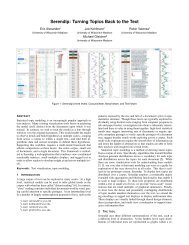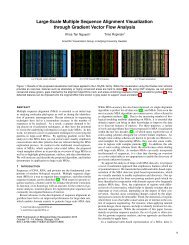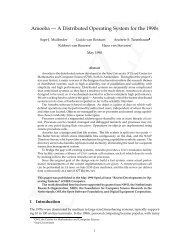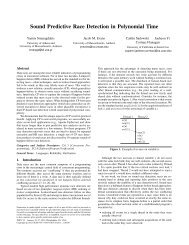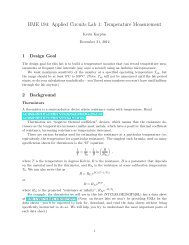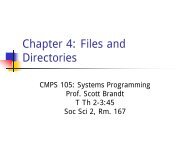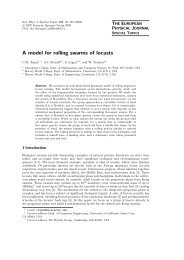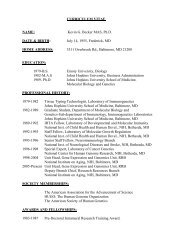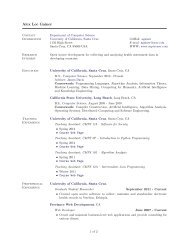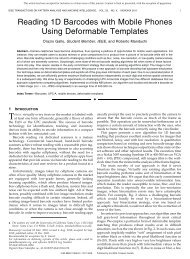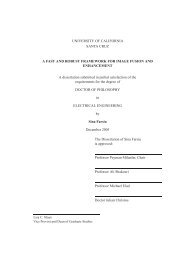Weird Languages (1) For Software Studies Michael Mateas ...
Weird Languages (1) For Software Studies Michael Mateas ...
Weird Languages (1) For Software Studies Michael Mateas ...
You also want an ePaper? Increase the reach of your titles
YUMPU automatically turns print PDFs into web optimized ePapers that Google loves.
INTERCAL borrows only variables, arrays, text input/output, and assignment from other<br />
languages. All other statements, operators and expressions are unique (and uniquely<br />
weird). INTERCAL has no simple if construction for doing conditional branching, no<br />
loop constructions, and no basic math operators — not even addition. Effects such as<br />
these must be achieved through composition of non-standard and counterintuitive<br />
constructs. In this sense INTERCAL also has puzzle aspects.<br />
However, despite the claim that this language has “nothing at all in common with any<br />
other major language”, INTERCAL clearly spoofs the features of contemporaneous<br />
languages, combining multiple language styles together to create an ungainly, unaesthetic<br />
style. From COBOL, INTERCAL borrows verbose, English-like constructs, including<br />
optional syntax that increases the verbosity; all statements can be prepended with<br />
PLEASE. Sample INTERCAL statements in this COBOL style include FORGET,<br />
REMEMBER,ABSTAIN and REINSTATE. From FORTRAN, INTERCAL borrows the<br />
use of optional line numbers, which can appear in any order, to mark lines, and the DO<br />
construct, which in FORTRAN is used to initiate loops. In INTERCAL, however, every<br />
statement must begin with DO. Like APL, INTERCAL makes heavy use of single<br />
characters with special meaning, requiring even simple programs to be liberally sprinkled<br />
with non alphanumeric characters. INTERCAL exaggerates the worst features of many<br />
languages and combines them together into a single language.<br />
Thirty-three years later, INTERCAL still has a devoted following. Eric Raymond, the<br />
current maintainer of INTERCAL, revived the language in 1990 with his implementation<br />
C-INTERCAL, which added the COME FROM construct to the language — the inverse of<br />
the much-reviled GO TO.<br />
While parody languages comment on other programming languages, languages in the<br />
minimalist vein comment on the space of computation. Specifically, they call attention to<br />
the very small amount of structure needed to create a universal computational system. A<br />
“system” in this sense can be as varied as a programming language, a formal<br />
mathematical system, or a physical processes, such as a machine. Universal computation<br />
was discovered by Alan Turing and described in his 1937 investigation of the limits of<br />
computability, “On Computable Numbers.” [Turing 1936] A universal system can<br />
perform any computation that it is theoretically possible to perform; such a system can do<br />
anything that any other formal system is capable of doing, including emulating any other<br />
system. This property is what allows one to implement one language, such as Perl, in<br />
another language, such as C, or to implement an interpreter or compiler for a language<br />
directly in hardware (using logic gates), or to write a program that provides a virtual<br />
hardware platform for other programs (as the Java Virtual Machine does). Universality in<br />
a programming language is obviously a desired trait, since it means that the language<br />
places no limits on the processes that can be specified in the language.<br />
Minimalist languages strive to achieve universality while providing the smallest number<br />
of language constructs possible. Such languages also often strive for syntactic<br />
minimalism, making the textual representation of programs minimal as well. Minimal<br />
languages are sometimes called Turing Tarpits, after epigram 54 in Alan Perlis’ Epigrams



